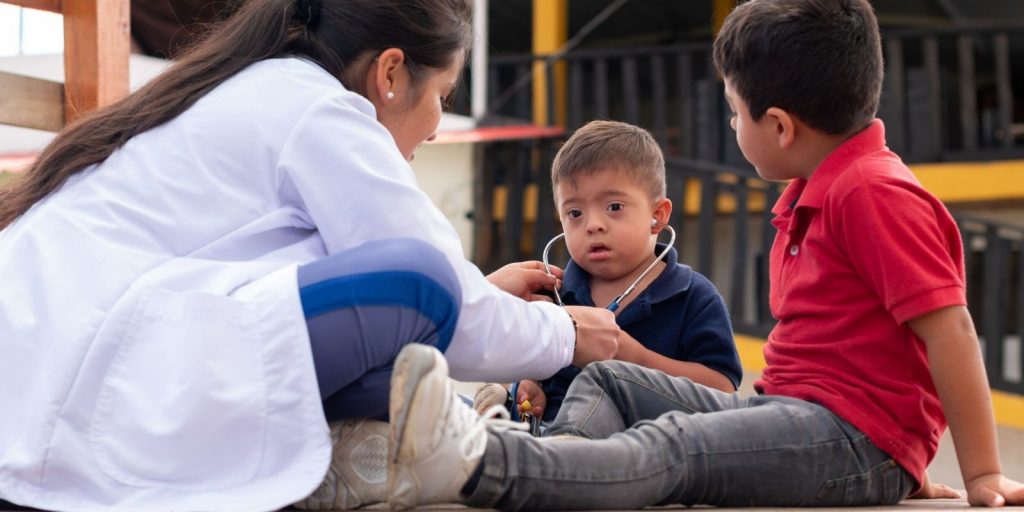
Child health
Heart.
Roughly half of babies born with Down syndrome will have a heart defect but less than one in five have a serious problem.
It is important to identify any serious problems in the first two months of life because early treatment may be needed.
The UK Down’s Syndrome Medical Interest Group (DSMIG) recommends that by 6 weeks of age, a formal heart assessment including an echocardiogram has been carried out which should identify nearly all serious problems.

We have worked with experts around the world to develop a global expert consensus statement on cardiac disease in people with Down syndrome.
An article has been published in the Journal of Congenital Cardiology, January 2021, which you can access here:
Our aim is to foster communication between experts, direct future research, and inform future practice guidelines for the diagnosis and management of cardiovascular disease in people with Down syndrome.
Eyes.
The eye problems which may affect children with Down syndrome are commonly those which occur in any group of children – they just tend to occur more frequently and sometimes to a more marked degree.
Therefore it is especially important to have their eyes checked.

Ears and hearing.

Ears and hearing should be examined at a yearly health check.
Most children with Down syndrome will have otitis media with effusion (glue ear) in childhood. This is sometimes treated with ventilation tubes (grommets). Glue ear usually resolves in adolescence but may persist in some people.
Hyperacusis is more prevalent in individuals with Down syndrome. Hyperacusis is an increased sensitivity to sounds. Individuals may feel pain or discomfort when they hear sounds that most people are able to tolerate. If suspected, a
referral to an audiologist is recommended.
Thyroid.
Thyroid problems are more common in people with Down syndrome than in the general population.
Babies born with Down syndrome should have a routine blood spot test in the first six weeks of life followed by a screening blood test when they reach their first birthday.
Children with Down syndrome should have a screening blood test at least every two years.

Sleep.

Sleep problems are common in children with Down syndrome.
These can be behavioural or physical in nature (related to sleep-disordered breathing) or a combination.
Sleep-disordered breathing is characterised by repeated pauses in breathing during sleep (sometimes referred to as sleep apnoea).
Sleep problems should be investigated by a specialist to exclude underlying causes.
Coeliac disease.
Coeliac disease is a type of malabsorption where the bowels are unable to absorb particular nutrients from food.
Coeliac disease is more common in people with Down syndrome.
Treatment of coeliac disease is by special diet excluding gluten. This should be supervised by a dietitian.

Epilepsy.

Epileptic spasms are uncommon epileptic seizures. Epileptic spasms occur in around 5% of children with Down syndrome.
Epileptic spasms usually occur in children aged between 3 and 6 months old and not older than 12 months.
Families may notice that their child’s head will suddenly nod forwards. Sometimes the arms or legs will also quickly move and their child may become upset. The movements are very brief (lasting less than a second), but may occur in “clusters” where several of these movements occur close together. These clusters may happen after the child wakes from sleep.
Neck instability.
The joints at the top of the spine and at the base of the skull allow us to shake and nod our heads.
In people with Down syndrome, the ligaments (tissue that connects one bone to another bone, holding a joint together) are stretchier. So joints may be looser and more flexible which can lead to slippage of the vertebrae (the bones that surround and protect the spinal cord).


Problems can develop if a vertebra slips too far and puts pressure on the nerves in the spinal cord. This can be a gradual process or it can happen if a person is jolted suddenly such as when a whiplash injury occurs.
A doctor suspecting that neck instability may be present will probably refer that person to either an orthopedic surgeon or a spinal neurosurgeon.
Our work in health.

Inclusive health
We advocate for everyone to enjoy the highest attainable standard of health, without discrimination.

